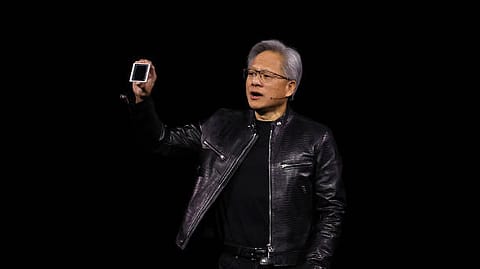Jensen Huang’s big claim: Nvidia wins Trump’s nod to ship H20 AI chips to China amid U.S.-China tech standoff
Nvidia CEO Jensen Huang says the Trump administration has approved export licenses for H20 AI chips to China. The move comes amid US-China tech tensions and could be a breakthrough for Nvidia in the AI chip race.

Nvidia’s CEO Jensen Huang has said that the semiconductor major has attained a clearance from the Donald Trump administration to ship its advanced H20 artificial intelligence chips to China, a major breakthrough for the company as it finds itself in the midst of an intense U.S.-China competition over AI and tech.
In a company blog, Chief Executive Officer Jensen Huang claimed that the U.S. government has agreed to grant export licenses for the H20 chips, which are tailored for AI workloads. Huang, who is currently visiting Beijing for a supply chain conference, also made the announcement in an interview aired on China’s state-run CGTN.
“The U.S. government has assured Nvidia that licenses will be granted, and Nvidia hopes to start deliveries soon,” Nvidia's blog post said, as reported by ABC News.
Separately, Huang also told CGTN: “Today, I'm announcing that the U.S. government has approved for us filing licenses to start shipping H20s,” adding, “half of the world's AI researchers are in China.” He further emphasized the importance of maintaining a U.S. presence in the Chinese tech ecosystem: “It’s so innovative and dynamic here in China that it's really important that American companies are able to compete and serve the market.”
The development follows months of lobbying by Nvidia and other U.S. tech executives, who have warned that tightening restrictions on chip exports could stifle American competitiveness and inadvertently accelerate China’s domestic AI push. Huang reportedly met with former President Donald Trump and U.S. policymakers earlier this year to make the case for easing curbs, ABC News reported.
The H20 chip, a modified version of Nvidia’s high-performance processors designed to comply with U.S. export rules, had been caught in a regulatory bind after the Biden administration in April imposed fresh restrictions on the sale of advanced semiconductors, including Nvidia’s H20 and AMD’s MI308, to China. The company had warned investors that the curbs could cost it up to $5.5 billion in lost revenue.
Nvidia’s participation in the China International Supply Chain Expo in Beijing this week underscores its efforts to maintain a foothold in the world’s second-largest AI market. Huang met with Ren Hongbin, chairman of the China Council for the Promotion of International Trade, which hosted the event.
Recommended Stories
The approval comes at a time of heightened sensitivity around AI technology and its potential military applications. The U.S. has been cautious in granting export permissions amid concerns about China's development of systems such as the DeepSeek AI chatbot, which debuted earlier this year.
Still, Nvidia’s go-ahead to begin shipping chips to China is a rare point of détente in a broader technological Cold War. As Nvidia races to cement its dominance in global AI infrastructure—last week it became the first company to surpass a $4 trillion market value—access to the Chinese market could prove vital to sustaining its momentum.